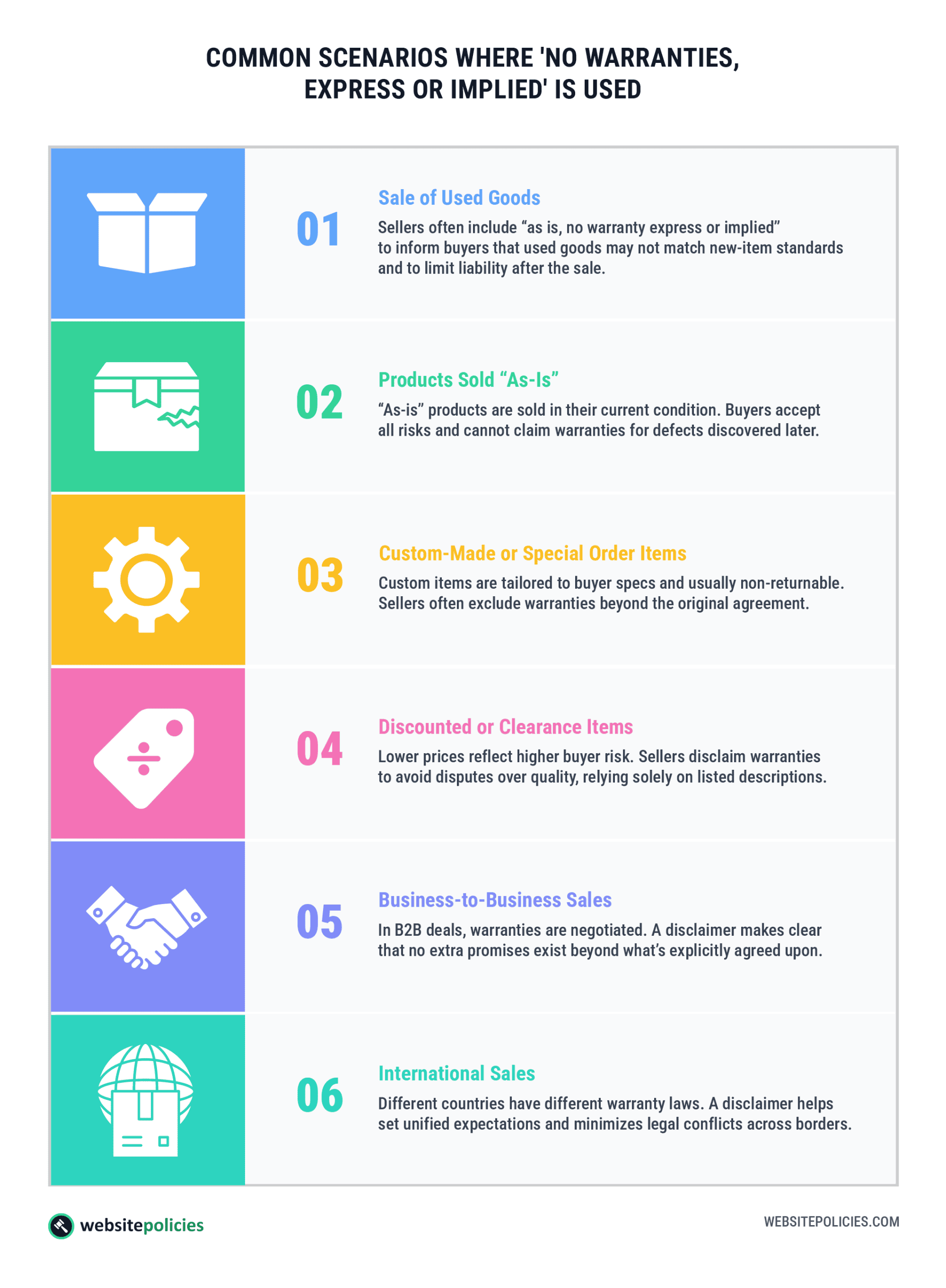A disclaimer of warranty is an assurance that the seller accepts no responsibility for the quality or performance of a product beyond certain conditions.
It states that the seller makes no warranties express or implied regarding a product’s fitness for normal use.
As an online business owner, one of the first things you need to do is learn the differences between an express and implied warranty.
An express warranty provides specific guarantees explicitly stated by the seller. On the other hand, an implied warranty ensures minimum standards of quality and reliability under the law. Below, we’ll talk about how these disclaimers can benefit your business.
- A disclaimer of warranty can be a powerful tool to protect your business from legal liability.
- Carefully consider the specific products or services you offer before including a “no warranties” clause. Some products or services may require certain warranties by law.
- Use a disclaimer generator to ensure your “no warranties” clause is precise and tailored to your specific needs.
Table of Contents
PRO TIP: Take the hassle of writing your own disclaimer away with our disclaimer generator trusted by over 200,000 businesses. It’ll save you hours of work and possible costly legal mistakes.
What Does “No Warranties, Express or Implied” Mean in a Disclaimer?
The phrase “no warranties express or implied” means that the seller does not guarantee the quality or performance of a product. Essentially, they disclaim any express or implied warranties that could hold them accountable for issues arising after the sale.
That said, is there a difference between express and implied warranty?
Express warranties are specific promises made about a product. These promises constitute an express warranty if they are included in the sales contract or product advertisement.
On the other hand, implied warranties automatically apply by law to ensure a product is fit for its generally intended use and meets a minimum standard of quality.
By stating “no warranties, express or implied,” the seller clarifies that such express or implied warranties do not apply. This can include disclaiming the:
- Implied warranty of merchantability (that a product will work as generally expected); and the
- Implied warranty of fitness for a particular purpose (that the product will be suitable for a specific use that the buyer has in mind).
Furthermore, when a disclaimer includes “except as otherwise expressly stated,” it means any warranties the seller wishes to uphold must be clearly outlined.
This helps ensure there are no implied representations or warranties of any kind beyond those explicitly mentioned. This safeguards the business from claims based on misunderstandings or unspoken expectations.
Why Do Businesses Include a “No Warranties, Express or Implied” Clause?
Businesses include a “no warranties express or implied” clause to limit their liability and clarify what is not covered by them.
This helps prevent misunderstandings and potential legal disputes over the quality and functionality of a product or service.
Disclaimers often include this clause for the following reasons:
- To avoid liability for product defects: If a product is defective and causes harm or damage, the business could be held liable for negligence or breach of warranty. A disclaimer can help protect the business from these potential claims.
- To comply with legal requirements: Under the Uniform Commercial Code or UCC, the products must be fit for the ordinary purposes for which they are sold. However, businesses can disclaim this implied warranty.
Additionally, the Magnuson-Moss Warranty Act sets forth certain requirements for written warranties. Businesses may choose to avoid these requirements by not providing any warranties.
- To protect intellectual property rights: If a business sells a product or service protected by intellectual property rights, they may want to include a disclaimer to avoid any implied warranties related to the intellectual property.
- To shift the risk to the buyer: By saying no warranty is made, the business is essentially saying that the buyer assumes the risk of any defects or problems with the product or service. This can be particularly important for businesses that sell complex or high-risk products.
- To promote a Buyer Beware mentality: A disclaimer can help create a mentality where buyers are responsible for researching and understanding the product or service before purchasing.
Using the “no warranties express or implied” clause, businesses can clearly define the bounds of their responsibility regarding the products or services they offer.
Are “No Warranties, Express or Implied” Clauses Legally Enforceable?
Yes, “no warranties, express or implied” clauses are generally legally enforceable, provided they are clearly stated and comply with applicable laws.
When a company makes a no warranties statement, it’s declaring that it makes no representation or warranty that the goods will meet further standards beyond those expressly stated.
Unless an express warranty may have been specifically set forth by the seller, no other assurances exist. However, enforceability can depend on how these disclaimers are presented.
In my experience, making sure that disclaimers are clear and prominently displayed can make a big difference in their enforceability.
I always recommend double-checking that any disclaimers are written in plain language, so there’s no room for misinterpretation.
An express warranty must be clearly defined and conspicuously communicated to be legally binding. In some scenarios, whether a warranty is disclaimed might not entirely exempt a seller from certain minimum standards of quality and fitness implied by law.
For complex situations or in cases where significant liabilities could arise, consult with a professional who can provide legal help.
A lawyer can help ensure that warranty disclaimers are drafted correctly and enforceable under the specific laws that apply.
PRO TIP: Always tailor disclaimers to your product specifics and review them regularly. Laws change, and so should your legal statements.
Common Scenarios Where “No Warranties, Express or Implied” Is Used
A “no warranties, express or implied” disclaimer is commonly seen in various business transactions to protect sellers and inform buyers about the state and quality of the product.
Here are some typical scenarios where this clause is used:

Sale of Used Goods
Used goods may not meet the original standards for new items, making warranties impractical. This is why in the sale of goods that are used, sellers often include the phrase “as is no warranty express or implied.”
For example, here’s how Bonanza, an online selling site, worded it on its User Agreement page:

This makes it clear to the purchaser that they are buying the item with full knowledge of the conditions. In turn, they cannot hold the seller accountable for any issues discovered afterward.
Products Sold “As-Is”
Products marked “as-is” carry a straightforward disclaimer. This tag warns the buyer that whatever condition the item is in at the point of sale is what the buyer accepts, without expecting recourse if problems arise later.
This situation is typical where the seller may not have complete knowledge of the conditions of the goods or chooses to sell them without repairs.
Custom-Made or Special Order Items
For items made to customer specifications, the seller might disclaim warranties to avoid expectations that go beyond the agreed specifications.
These goods are often non-returnable, so a disclaimer of warranties helps manage expectations. It also emphasizes that the buyer is relying on the seller’s skill only as per the explicit agreement and without any further assurance.
Discounted or Clearance Items
Items sold at a discount or on clearance might come with a disclaimer of warranties to avoid disputes about quality expectations. After all, the reduced price reflects the risk that the purchaser is taking.
Justrite made this clear in its Terms and Conditions page:

The seller usually makes it clear that the lower price correlates with the absence of guarantees. This encourages buyers to rely solely on the available descriptions of the goods and not on any oral or written representations and warranties.
Business-to-Business Sales
In sales between businesses, warranties are often negotiated and tailored. The disclaimer of warranties clause becomes crucial as it specifies that no additional warranties apply beyond those negotiated.
This precision is vital in transactions where each party knows or has reason to know the risks involved and the legal frameworks at play.
When negotiating, I’ve found that it’s helpful to consider how the warranty terms could impact your long-term business strategy, not just the immediate deal.
I also like to dig deeper into any potential risks that might not be immediately apparent, as these could influence the effectiveness of the disclaimer of warranties clause in protecting your business.
International Sales
In international trade, differing laws about consumer protection and warranties can complicate transactions.
Disclaimers help align expectations and ensure both parties are aware of the terms, especially when types of warranties and consumer protection laws vary significantly between countries.
Best Practices When Writing a “No Warranties Express or Implied” Statement
A well-drafted “no warranties, express or implied” statement can be a valuable tool for protecting your business. Here are some best practices to keep in mind when writing this disclaimer:
- Use Clear and Unambiguous Language: Do not use legal jargon that could confuse the buyer. Specify what is being disclaimed, whether express, statutory, or otherwise, to prevent misinterpretations and potential legal challenges.
- Specify the Scope: Define what aspects of the warranty are being disclaimed. For instance, are you disclaiming all warranties related to quality, durability, and functionality, or just specific elements? This helps prevent assumptions and disputes about the coverage.
- Display It Prominently: A warranty disclaimer should never be hidden in fine print. Ensure it is clearly visible and acknowledged by the buyer, possibly requiring a signature or initial to indicate that the terms are understood.
- Align with Relevant Laws: Verify that your disclaimer complies with local, state, federal, or international laws. Some jurisdictions may not allow disclaimers on certain types of warranties, law or otherwise.
- Get Legal Approval: Before finalizing the statement, have it reviewed by a legal expert who can ensure it is enforceable and complies with all relevant laws. This step can save a lot of trouble by preventing legal issues down the road.
- Include Examples for Clarity: Sometimes, providing examples of what is not covered can help clarify the intent of the buyer and reduce misunderstandings.
- Update as Necessary: Laws and business practices evolve. Regularly review and update your disclaimers to reflect current standards and legal requirements.
A disclaimer cannot protect you from liability for fraud, intentional misrepresentation, or gross negligence. Also, know that the buyer may still have certain rights under applicable laws.
No Warranties, Express or Implied Sample Clauses
Here are some examples of how the “no warranties, express or implied” statement can be used in different contexts:
Standard Product Sales Disclaimer
In its Terms and Conditions of Sale, Skyline Equipment, LLC specifies that the only warranties applicable to the consumer goods are those hereby explicitly provided by the original manufacturer.

Any description of the goods, whether made in promotional materials or orally or in writing, is solely for identification purposes and not meant to be a warranty that the goods will match the description including without limitation any quality or functionality expectations.
This means that any warranty coverage is limited to what the manufacturer has stated, and no additional warranties are implied by the seller.
Software License Disclaimer
The software license disclaimer by SimplicityDX is a critical component of their licensing agreement, ensuring both parties understand the limits of liability and warranty coverage. Here’s a breakdown of the key elements within this disclaimer:

The clause “except as expressly set forth herein” ensures that no additional implied warranties are assumed. Essentially, unless the agreement specifically warrants that the goods they sell meet certain criteria, such assurances are not provided.
While not explicitly stated in the provided clause, a common implication of such disclaimers is that SimplicityDX does not guarantee that the software will operate without errors.
This is a typical expectation set by software providers to manage customer expectations regarding the functionality and reliability of the software.
Service Agreement Disclaimer
Welle Co’s service agreement disclaimer is structured to align with legal requirements while limiting the company’s liability to predefined remedies in case of a warranty claim.

It recognizes that certain warranties arising from legislation cannot be excluded. These are warranties that the law explicitly requires to be part of the contract, regardless of what the parties agree upon.
Moreover, in the event of a breach of the implied warranty, Welle Co limits its liability to several specific remedies. This limitation is crucial as it defines the extent of their responsibility and the actions they will take to address a breach.
PRO TIP: A disclaimer generator can streamline the creation of precise, legally sound clauses. Just customize it to fit your unique business needs!
Frequently Asked Questions
Can a product still have a warranty if it includes a “no warranties, express or implied” clause?
Yes, a product can still have a warranty with specific terms if it excludes others either express or implied. This must be explicitly stated.
Do “no warranties, express or implied” clauses apply to both goods and services?
Yes, “no warranties, express or implied” clauses apply to both goods and services. They limit liability across transactions.
Can a “no warranties, express or implied” clause affect my business’s reputation?
Yes, this type of warranty disclaimer can affect a business’s reputation if customers expect a warranty regarding quality. Clear communication is key.
What should I consider before including a “no warranties, express or implied” clause in my sales agreements?
Consider the applicable laws and regulations in your jurisdiction. Evaluate whether the disclaimer aligns with your goals and the nature of the products or services you offer.
How can I clearly communicate a “no warranties, express or implied” clause to my customers?
Use simple language and display the disclaimer in your sales agreements or purchase orders. You can also provide a summary of the disclaimer in a separate document or on your website.



